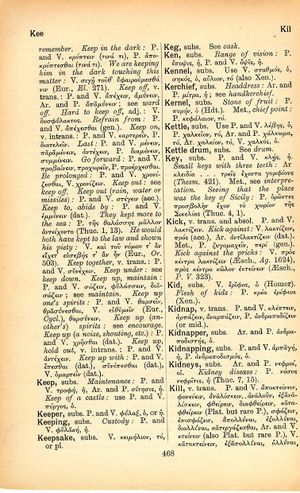key
κινδυνεύει μὲν γὰρ ἡμῶν οὐδέτερος οὐδὲν καλὸν κἀγαθὸν εἰδέναι, ἀλλ᾽ οὗτος μὲν οἴεταί τι εἰδέναι οὐκ εἰδώς, ἐγὼ δέ, ὥσπερ οὖν οὐκ οἶδα, οὐδὲ οἴομαι· ἔοικα γοῦν τούτου γε σμικρῷ τινι αὐτῷ τούτῳ σοφώτερος εἶναι, ὅτι ἃ μὴ οἶδα οὐδὲ οἴομαι εἰδέναι. → for neither of us appears to know anything great and good; but he fancies he knows something, although he knows nothing; whereas I, as I do not know anything, so I do not fancy I do. In this trifling particular, then, I appear to be wiser than he, because I do not fancy I know what I do not know.
English > Greek (Woodhouse)
subs.
P. and V. κλῄς, ἡ. Small keys with three teeth: Ar κλειδία . . . τρεῖς ἔχοντα γομφίους (Thesm. 421). Met., see interpretation. Seeing that the place was the key of Sicily: P. ὁρῶντες προσβολὴν ἔχον τὸ χωρίον τῆς Σικελίας (Thuc. 4, 1).

